These 5 Sustainably Minded Companies Are Setting New Standards for the Fashion and Beauty Industries
- Oops!Something went wrong.Please try again later.
These innovative Global Vision Awards honorees create beautiful products that also help the planet.
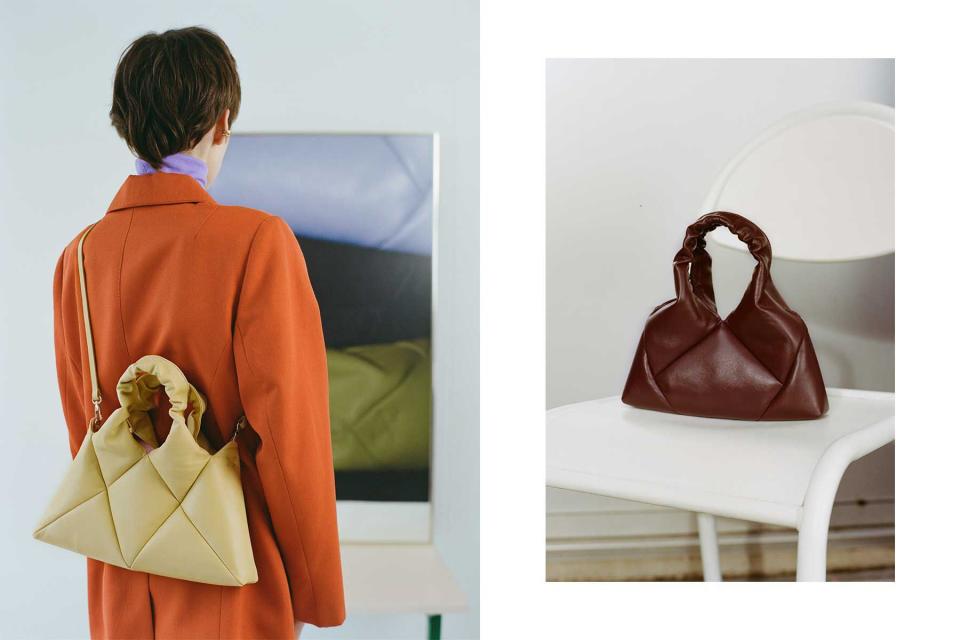
Neige Augusta Celeste/Courtesy of Reco
Reco’s Mini Didi bag makes smart use of leather scraps.The Travel + Leisure Global Vision Awards aim to identify and honor companies, individuals, destinations, and organizations that are taking strides to develop more sustainable and responsible travel products, practices, and experiences. Not only are they demonstrating thought leadership and creative problem-solving; they are taking actionable, quantifiable steps to protect communities and environments around the world. What's more, they are inspiring their industry colleagues and travelers to do their part.
The fashion and beauty industries can get a bad rap for overconsumption and wastefulness, but these innovators prove that style and substance can absolutely coexist — and pave the way for a more sustainable future. As travelers consider how to spend their money, they’re filling their closets (and suitcases) with items that speak to their personalities and their values. Among this year’s mission-oriented honorees, you’ll find a skincare collection that minimizes wasteful packaging, an accessories line that makes smart use of would-be scrap materials, and a clothing line that outfits the whole family, supports fair wages along the supply chain, and regenerates resources used in the manufacturing process. These companies demonstrate that creative, conscientious thinking isn’t just good for business, but good for the planet. — T+L Editors
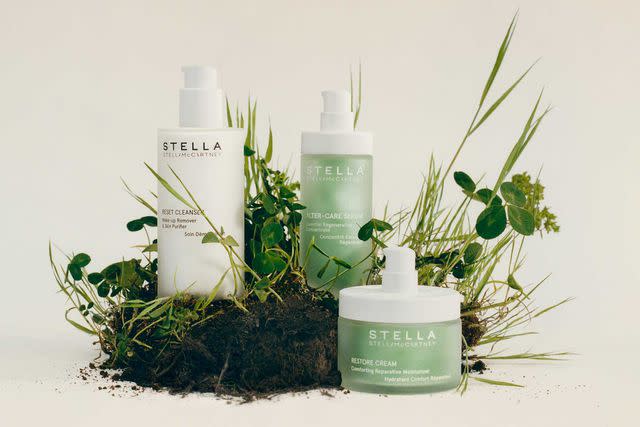
Courtesy of Stella by Stella McCartney
Stella McCartney's cleanser, serum, and cream.Stella by Stella McCartney
British fashion designer Stella McCartney championed sustainability long before it was a marketing buzzword, incorporating organic textiles, vegan leather, and recycled fabrics into garments for the fashion label she founded in 2001.
Last year, she carried her earth-first ethos over to skin care with Stella by Stella McCartney, a collection that comprises a cleanser, a serum, and a cream. The formulas go beyond standard European regulations to exclude nearly 2,000 ingredients that McCartney and her team deemed unnecessary and potentially polluting, including silicones and sulfates. Cutting carbon emissions is also part of the brand; this means shipping by sea freight instead of air and offering minimally packaged refills that lower the products’ environmental impact. — Chadner Navarro
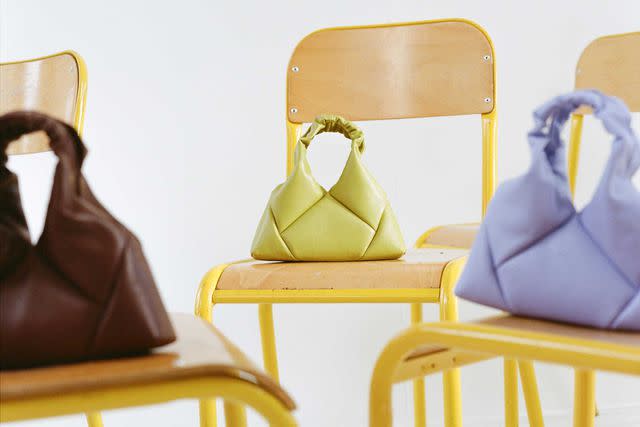
Neige Augusta Celeste/Courtesy of Reco
Reco’s Mini Didi bags make smart use of leather scraps.Reco
Fashion designer Bea Recoder is intimately familiar with the excessive, never-enough nature of her industry. “I realized how much waste we were generating,” says the Balenciaga and Chloé alum. “Entire collections get canceled, leading to time and money being wasted.”
During COVID lockdowns, Recoder launched her Paris-based handbag line Reco to champion a slow-fashion timeline. Recoder sources high-quality deadstock leather from the factories and tanneries used by labels like Bottega Veneta and Valentino. To make the most of the leftover leather, she uses a clever patchwork technique that doesn’t require enormous cuts of hide.
What started as a limitation has become Recoder’s trademark aesthetic. And to eschew over-consumerism, Recoder is not making new styles just for the sake of seasonal rollouts. “I only want to launch new things if they’re strong pieces and if they make sense,” she explains. She also tries to minimize packaging, using upcycled textiles for dust bags and doing away with plastic. “They seem like little details, but everything counts.” — C.N.
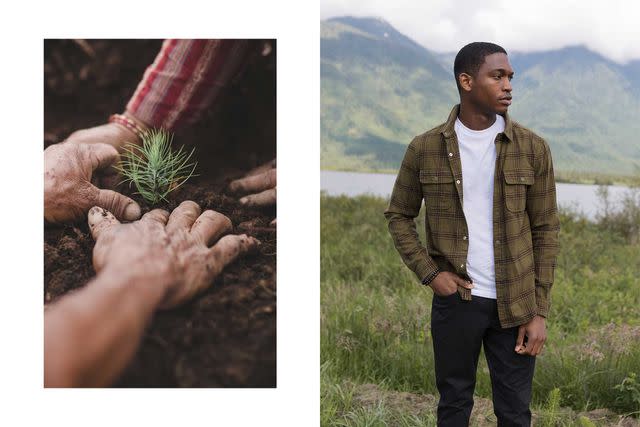
Courtesy of Tentree
Tentree plants kapok trees in Indonesia and uses the plant’s fibers to make clothing, like the Kapok Colville shirt.Tentree
Online clothing company Tentree was founded in Saskatchewan, Canada, in 2012 with a simple but powerful premise: plant 10 trees for every item purchased. To date, Tentree has planted nearly 100 million of them. It’s also a Certified B Corporation, meaning the products are made in safe and fair working conditions and constructed from sustainably sourced or recycled materials. Carbon neutral since 2020, the company is now pushing to help restore resources. A case in point: to help offset the company’s use of kapok tree fibers in its men’s shirts, Tentree planted 56,000 of the species in Indonesia last year.
Under the Impact Wallet tab in their online accounts, consumers can see what actions their purchases have underwritten, and via Tentree’s Climate+ program, it’s possible for them to buy a cozy hoodie and help plant trees to sequester carbon, too. — Tom Vanderbilt
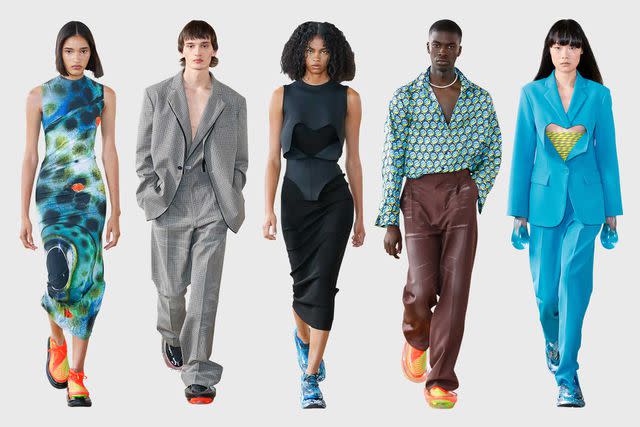
Courtesy of Botter
Botter’s Spring/Summer 2023 collection uses material made from recycled ocean plastics.Botter
In January 2022, designers Lisi Herrebrugh and Rushemy Botter left their jobs as joint creative directors at the Paris fashion house Nina Ricci to focus on their own label, Botter. Drawing inspiration from the Caribbean (Herrebaugh has lived in the Dominican Republic, Botter hails from Curaçao), the designs — elegantly pleated pink trousers, slouchy houndstooth suits with exaggerated shoulders — are audacious and modern. The production ethos is just as boundary-pushing.
The company aims to design 80 percent of their collections with recycled-ocean-plastic material (in partnership with Parley, an organization known for turning plastic waste into thread), with the rest being made of organic textiles like cotton and wool. Ocean health is a major part of the duo’s manifesto, which is why, during the pandemic, they started a coral-reef farm in Curaçao to help nurse bleached reefs back to life. — C.N.
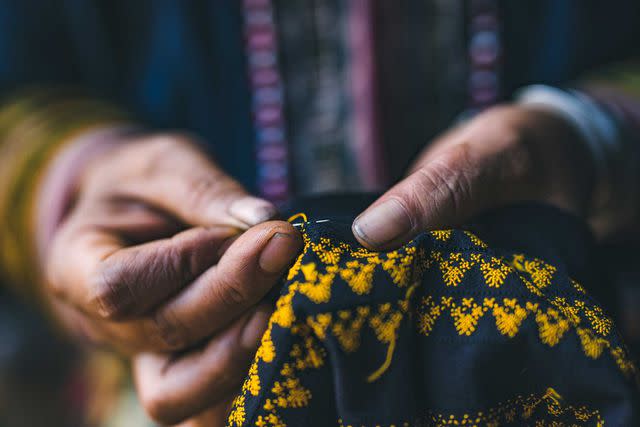
Bao Khanh/Courtesy of TextileSeekers
Embroidery by Red Dao artisans.TextileSeekers
A Vietnamese refugee raised in Australia, Thao Phuong spent almost 20 years working as a fashion designer in places like Singapore and New York City. But over time, she became disillusioned by the industry’s rapid, wasteful consumption.
In 2019, Phuong launched TextileSeekers, a boutique tour operator focused on Vietnam’s traditional textile artisanship and ethnic heritage. On six- and 11-day trips through the rural Mai Châu district in northern Vietnam, for example, visitors can attend hemp-making workshops with Blue Hmong people and learn about silk making in the town of Ban Lac. Speaking with locals, spending ample time in each destination, and being in natural landscapes are central to TextileSeekers’ mission.
“By connecting directly with small communities and businesses, we’re able to support them without a third party,” Phuong says. The company also partners with NGOs such as the Pacific Links Foundation, which supports survivors of human trafficking in Vietnam. — Hannah Selinger
For more Travel & Leisure news, make sure to sign up for our newsletter!
Read the original article on Travel & Leisure.

